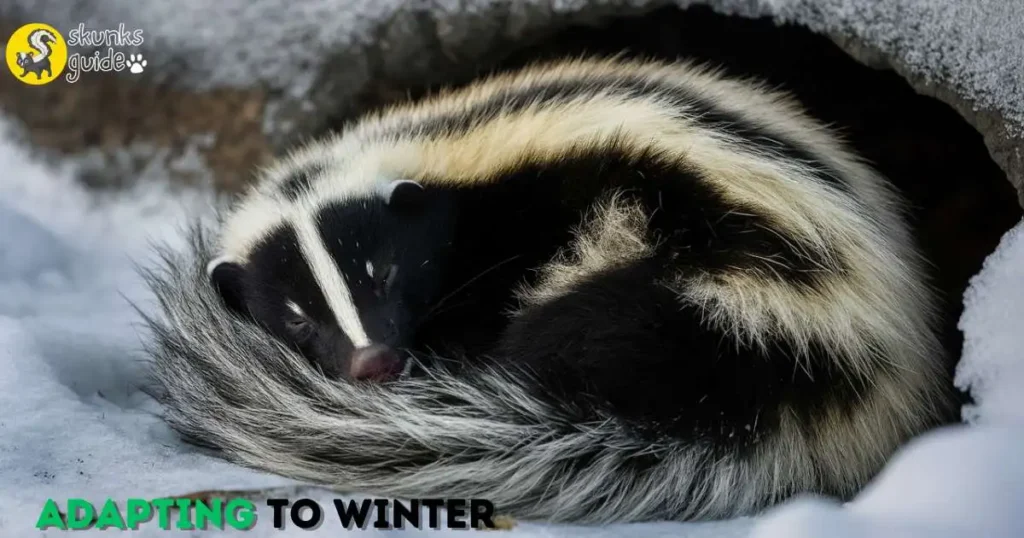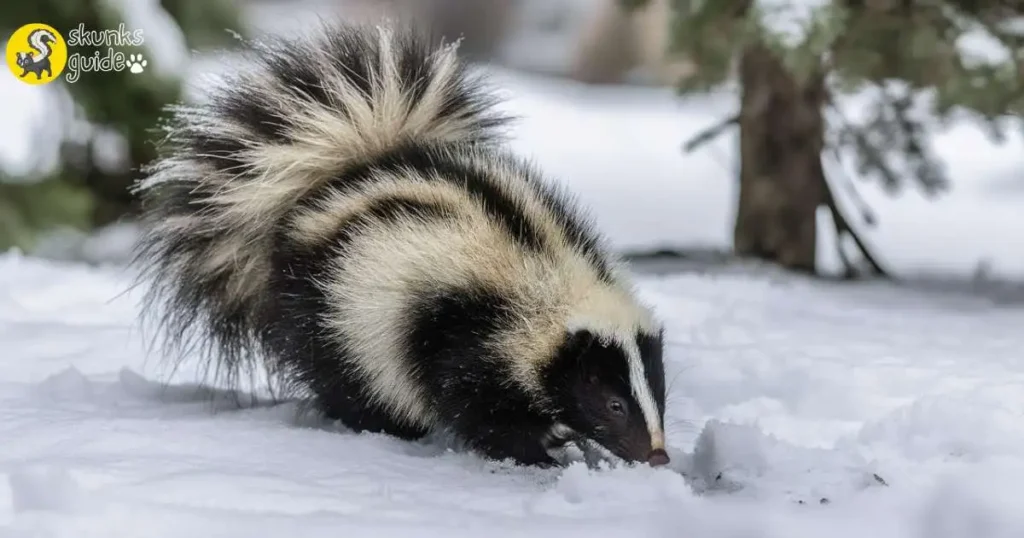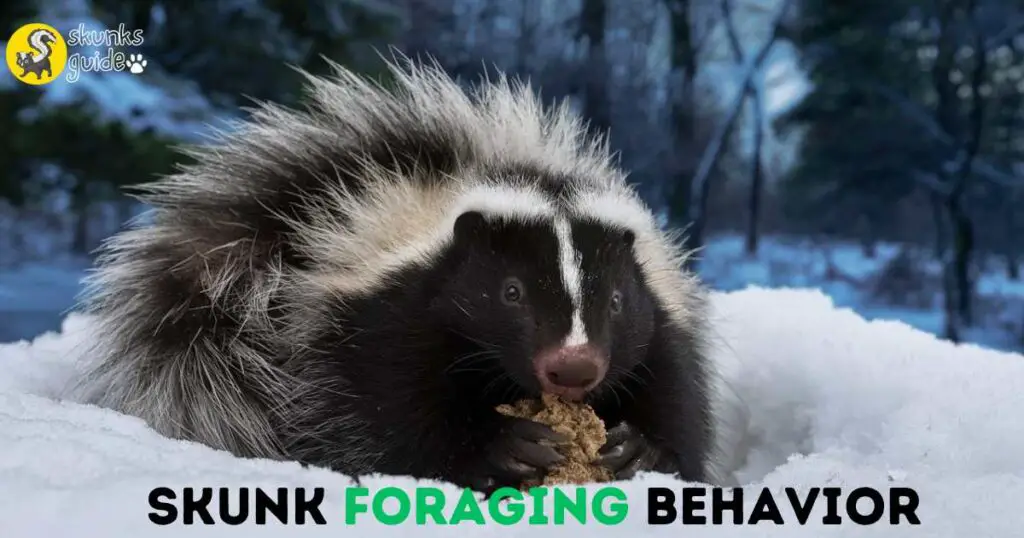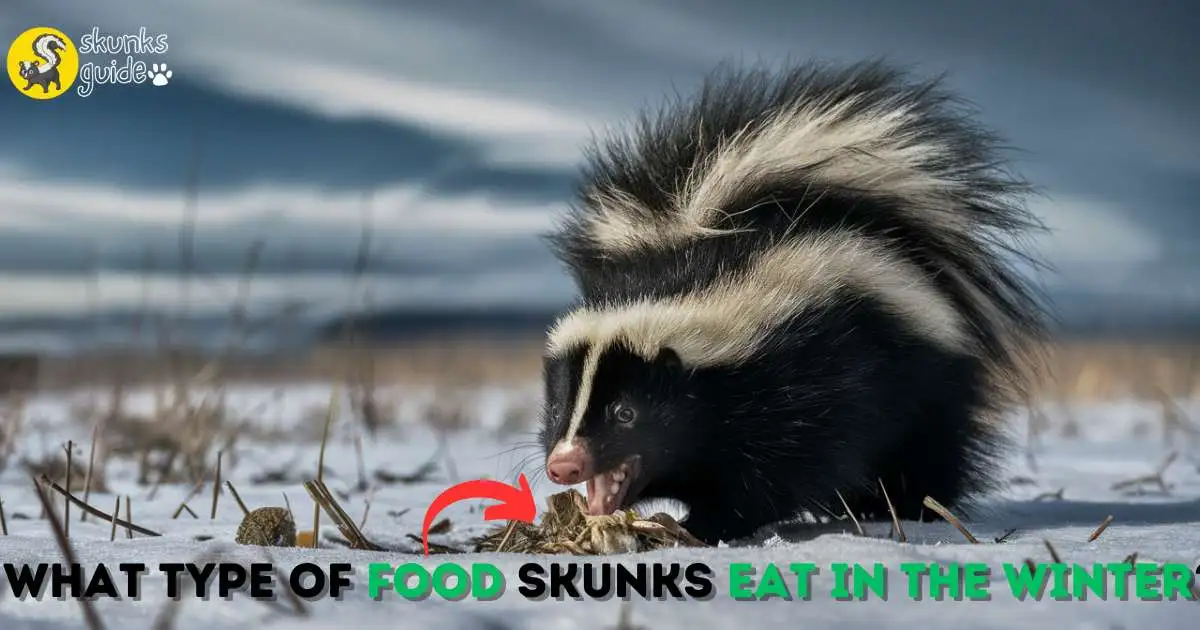Skunk Winter Diet: What Do They Eat?
Last updated on March 7th, 2025 at 10:49 pm
With the cold weather making food scarce, skunks need to get creative. From my research as a skunk pet owner, I’ve learned that these animals switch to eating things like fruits, nuts, and even the occasional insect or small animal. They might even scavenge through trash for scraps. Want to know how skunks manage to survive the toughest months? Read on to discover the surprising ways skunks stay nourished during winter.
Skunk Diet Basics
Understanding the diet of skunks is essential for appreciating these unique creatures. Skunks are omnivores, meaning they eat both plants and animals. Their diet changes based on the season and available food sources.
Primary Food Sources
Skunks have a diverse diet. Here are their main food sources:
- Insects: Skunks love to eat beetles, crickets, and grasshoppers.
- Fruits: They enjoy berries, apples, and other seasonal fruits.
- Small Animals: Skunks may hunt rodents, birds, and eggs.
- Plants: They eat roots, nuts, and some leaves.
These food sources provide the necessary nutrients skunks need to thrive.
Seasonal Dietary Changes
Skunks change their diet throughout the year. In winter, food becomes scarce. Here’s how their diet shifts:
| Season | Food Sources |
|---|---|
| Spring | InsectsYoung plantsEggs |
| Summer | FruitsVegetablesSmall mammals |
| Fall | FruitsSeedsInsects |
| Winter | Stored foodRootsOccasional scavenging |
During winter, skunks rely on stored food and scavenging. This adaptability helps them survive colder months.
Adapting To Winter
Skunks face challenges in winter. Food becomes scarce. They must adapt to survive. Their eating habits change to cope with the cold.

Metabolic Changes
As winter arrives, skunks undergo metabolic changes. Their bodies adjust to conserve energy. Here are some key changes:
- Lowered metabolism helps save energy.
- Body temperature decreases slightly.
- Reduced activity levels to minimize food needs.
These changes allow skunks to survive longer without food. They rely on stored fat for energy.
Foraging Strategies
Skunks use smart foraging strategies during winter months. They adapt their hunting and gathering techniques. Here are some methods skunks employ:
- Searching for buried food: Skunks dig through snow to find food.
- Scavenging: They look for leftovers from other animals.
- Eating plants: Some skunks consume roots and tubers.
- Hunting insects: They seek out hibernating insects in decaying logs.
These strategies help skunks find enough food to survive. They are resourceful animals, adjusting their diet as needed.
Winter Food Preferences
Skunks adapt their diet during winter months. They need to find food that is available and nutritious. Their winter food preferences change based on the environment. Let’s explore what skunks eat in winter.

Small Mammals And Insects
During winter, skunks hunt small mammals and insects. These provide essential nutrients. Here are some common targets:
- Rats
- Mice
- Voles
- Ground squirrels
Insects are also a part of their diet. Skunks dig in the snow for:
- Beetles
- Ants
- Grubs
These animals and insects give skunks the energy they need. They are skilled at finding food even under snow.
Plant Matter And Fruits
Skunks also eat plant matter during winter. Fruits and vegetables help them survive. Here are some preferred foods:
| Plant Type | Examples |
|---|---|
| Fruits | Apples, Berries, Grapes |
| Roots | Carrots, Turnips, Potatoes |
Skunks find these plants in gardens or fields. They are opportunistic eaters, making use of whatever is available.
Challenges Skunks Face
Winter brings unique challenges for skunks. Food becomes scarce. They must navigate dangers from other animals. Understanding these challenges helps us appreciate these fascinating creatures.
Food Scarcity
In winter, skunks struggle to find enough food. Many insects and plants are not available. Skunks rely on their adaptability to survive. They may consume:
- Fruits
- Seeds
- Small rodents
- Bird eggs
During this season, skunks often explore new areas. They may dig through the snow for hidden food sources. This behavior helps them endure harsh conditions.
Predation And Competition
Winter increases risks from predators. Skunks are vulnerable to:
| Predator | Threat Level |
|---|---|
| Foxes | High |
| Owls | Medium |
| Domestic dogs | High |
Competition for food also rises. Other animals search for the same resources. Skunks must be cautious. They often rely on their strong sense of smell.
Finding food while avoiding predators is a delicate balance. Skunks adapt their behavior to meet these challenges.
Skunk Foraging Behavior
Skunks are skilled foragers. They adapt their eating habits based on the season. In winter, food is scarce. Skunks must be clever to find enough to eat.

Nocturnal Feeding Habits
Skunks are mostly active at night. They search for food under the cover of darkness. This helps them avoid predators. Their keen sense of smell guides them to food sources.
- Active mainly during the night
- Use smell to locate food
- Avoid predators while foraging
Searching Techniques
Skunks use various techniques to find food. They dig, sniff, and scavenge. Here are some common methods:
- Digging: Skunks dig in the ground for insects.
- Sniffing: Their strong sense of smell helps locate food.
- Scavenging: They look for leftover food from other animals.
This adaptability ensures skunks can survive winter’s challenges.
Human Impacts On Skunk Diets
Human activities significantly affect what skunks eat during winter. Skunks adapt to urban environments. They find food sources in places humans frequent. This change affects their natural diet. Understanding these impacts helps us appreciate wildlife.
Urban Foraging
Skunks thrive in urban settings. They forage for food in parks, gardens, and backyards. Common food items include:
- Fruit from fallen trees
- Leftover pet food
- Birdseed spilled on the ground
- Compost piles
Skunks also dig through trash cans. They seek out easy meals. This urban foraging helps them survive winter.
Access To Human Waste
Human waste provides skunks with a rich food source. Skunks scavenge in dumpsters and garbage bins. They consume:
| Food Type | Examples |
|---|---|
| Food Scraps | Leftover pizza, bread, and fruits |
| Pet Waste | Dog food, cat food |
| Garden Waste | Vegetable scraps, spoiled fruits |
This access to human waste impacts skunk health. It can lead to diseases. Skunks may rely less on natural food sources. Urban environments change their eating habits.
Frequently Asked Questions
What Attracts Skunks To Your Property?
Skunks are attracted to properties with food sources, such as pet food or garbage. They also seek shelter in dense vegetation, under decks, or in burrows. Standing water and compost piles can draw them in as well. Keeping your yard clean and secure helps deter skunks effectively.
Where Do Skunks Go During The Winter?
Skunks hibernate during winter in burrows or dens. They seek shelter in abandoned animal homes or dig their own. This behavior helps them conserve energy and stay warm in cold weather. Skunks usually emerge in spring as temperatures rise and food becomes more available.
What Is Skunk’s Favorite Food?
Skunks primarily enjoy a diet of insects, fruits, and small rodents. They also eat eggs, plants, and human food scraps. Their foraging habits make them opportunistic feeders, allowing them to adapt to various food sources. Overall, skunks have a diverse palate that helps them thrive in different environments.
Conclusion
Understanding what skunks eat in winter helps us appreciate their adaptability. These resourceful animals rely on a varied diet, including insects, plants, and small mammals. By knowing their feeding habits, we can better support local wildlife. Observing skunks during this season can be both fascinating and enlightening for nature enthusiasts.

